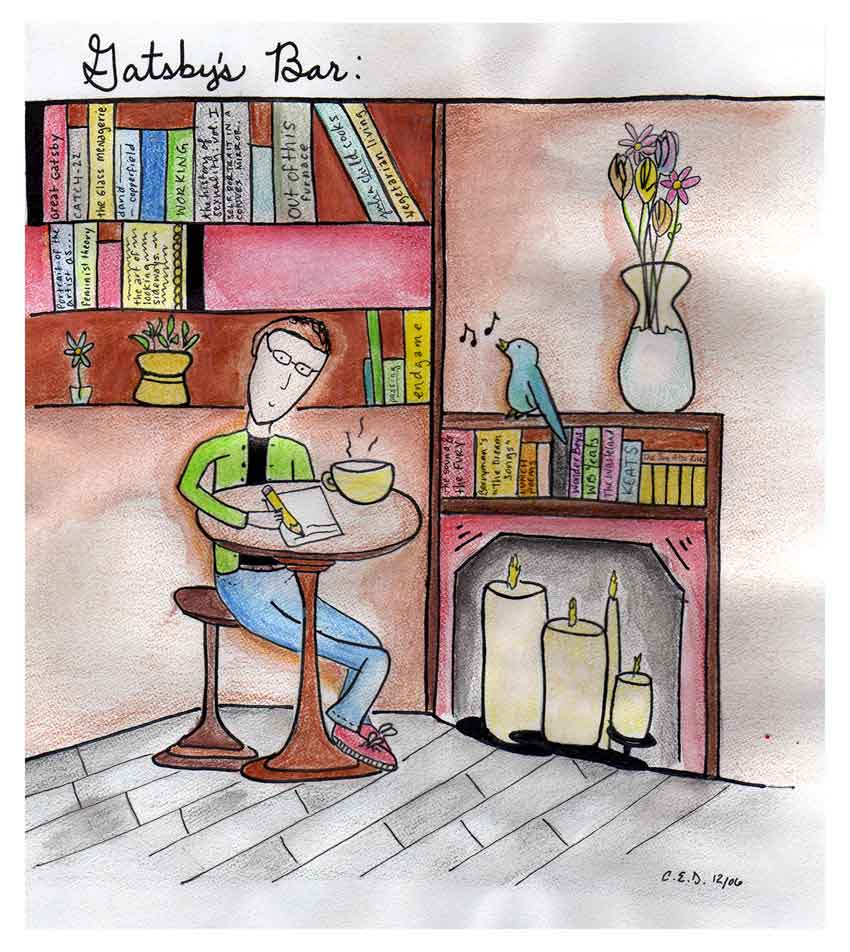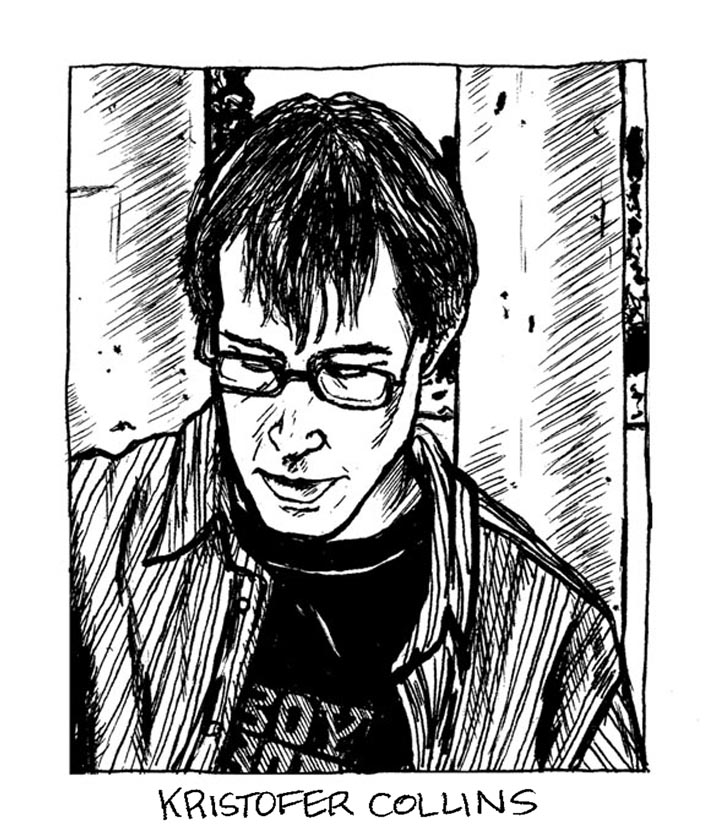 |
  
Gatsby’s Bar
In Search of Lost Bookshops
There
were Spring mornings in Oakland so exquisite, the air cool and dry, dusted with
sunlight and perfumed of car exhaust and coffee. Occasionally a breeze would
interject, offering its sharp chill as counterpoint to the almost Summery
feeling rising within, as I sat sipping my first cup of the day, watching the
sparse traffic traverse Forbes Avenue.
My
classes at Pitt would necessarily be forsaken; days like this, luxuriant soft
clouds of time, candy-floss pink and deeply sugared by the lazy warmth, were
meant for easing back and sipping something light, a book of poems open in
front of you, an attempt at a poem of one’s own tightly knotted in the margins
of the old browning page.
These were
days for secretly listening to the conversations bumping along all around; the
fast talkers, heavy thinkers, and humid lovers all releasing words into the
world, language pouring off them like carbon dioxide. “She had a face like Mary
Pickford; a face that could burn these buildings down,” someone behind me said
and I wrote it down and it became a rather poor poem in my sorry scribble but
ever since I’ve associated beauty with a kind of silent arson.
Ah,
the sunshine was like children tumbling down steps, heedless and joyful, no
harm could come to it so why not make the leap. This city, chaotic and hard,
covered in ashes and concrete, it grew itself in one’s heart like a garden on
such rich mornings. The city shone and the bad blood between us was unto a soap
bubble popping, gone as though it never had existed.
Leaving
the café and the spinning talk of strangers behind one floats the long corridor
of Forbes passing the sand-colored libraries and lecture halls, creeping
beneath the towering limestone exclamation, sliding up Craig, the shop fronts
blurring, cumin sharpening the air, to Fifth, itself a crying songbird, and
finally disappearing quickly into Shadyside.
A frail canopy of new leaves shivers and
crackles like static, like a radio caught between stations, the signals of this
new Spring make thick music of trees. The neighborhood is noisy with
architecture, shifting shapes and ornaments, planks of wood and steel ladders
lean against porches. There are kids hidden in backyards and dogs barking.
There
is poetry to be had all around and it is poetry that hastens one’s steps. There
is a shop to be sought off of Walnut and neither the fake noses nor fart gags
in the Variety Store window, nor the slumbering kittens of the Pet Pad will
distract or delay. A left onto Filbert, then just a few steps down into an
inconspicuous lacuna, through the heavy door, and into the tiny bookshop.
After
such a lovely march through the bright sea of sunshine, one’s eyes rapidly
dilate due to the sudden loss of light. The tenebrous space is disorienting at
first, but once acclimated, the walls of the Stonewall Bookshop veritably burst
wide with books, books, and many more books. Jerry Farber, bearded and
bespectacled, gray-haired and serene, calmly acknowledges your entrance then
quietly returns to reading the newspaper. Behind him a row of signed hardcover
Bukowski, as always captures one’s attention as though it were a wild
butterfly.

His shop
is rabbit hutch small, but neatly appointed with several display tables. Dark and cool, the space is absent of glare
and lit kindly by scant light fixtures. This place is a favorite get-away, an
island one gladly books passage to on warm and lovely days when college holds
no sway over one’s hard-pumping heart. The day is hungry for poetry and here toward
the back of the shop behind the literature (ooh maybe a pinch of Nabokov),
snuggled against the plays (Tennessee Williams is always such a flirt), is the
poetry section, humble and flawless as a haiku.
Except for
Jerry the shop is absent of other people. The ambient thrum of the lights and
cash register, the padded thud of one’s own footsteps, and the muted lapping
waves of street sounds diffusing through the door all mix together into a low
level humming as though the shop itself was purring some little song of its
own. Thumbing through fine books of poems, pages flipping, flapping like wings
– Elizabeth Bishop, Lawrence Ferlinghetti, Vladimir Mayakovsky, Frank O’Hara, Wallace Stevens, Yevgeny Yevtushenko.
Many
mornings were spent like this, idly reading poems, sitting cross-legged on the
floor while classes came and went. I regret no part of my truancy and my only
qualm is that I did not spend more time in Jerry’s shop.
When the
Stonewall went out of business, victim to the chains and a disinterested
neighborhood, I skipped class and walked to Shadyside one last time. It was
difficult to feel anything like the spiritedness inspired by previous visits.
Jerry was a sigh in gray clothing that day, disappointment in a shirt
unbuttoned at the collar. Jerry had slashed the prices on everything to move as
much stock out as possible. I bought a few Richard Wright paperbacks and was
sickened by my vulturism. We said a few words, Jerry and I, and that was it. I
read a few pages of The Outsider in a
nearby parking lot then walked back to Oakland.
The memory
of the bookshops that once were still holds sway over me. I freely admit to a
certain amount of romanticizing, which herein is on full peacock display, of
the old shops now vanished. Other personal favorites from the rogue’s gallery
of local indies were Ice-9 and Pinocchio. I purchased my first book by Frank O’Hara at Ice-9, a used copy of Lunch Poems, the very same book which I
carried stashed in my jacket during our recent The Return of The New Yinzer event, tucked close to my heart for
courage and protection. Rooting around in Pinocchio I stumbled virginally
across the work of Phillip Pullman. Having worked for nearly a decade at Jay’s
Bookstall, and being now in my fourth year at Caliban Bookshop, I’ve become
much more aware of the forces that make such shops impossible in our city.
Trending away from independent, locally owned businesses will inevitably, sadly
bleed away Pittsburgh’s identity.
But on
those great and everlasting spring days, I would pay for my stack of poetry and
quickly hit the bakery for pastries and coffee. With my treats in hand, both
sugary and sonnetty I would stroll up and across Walnut, where I’d set up
something like a picnic on an available wooden bench. After a nibble of warm muffin
and a slurp of steaming coffee, I’d tuck in and read poems while the traffic
ambled along beside me and the frenzied kittens leapt and spun in the pet shop
window behind.

 |
Kristofer Collins is an editor at The New Yinzer and owner of Desolation Row CDs. A book of his poems entitled “King Everything - Selected Poems” will be published later this year by Six Gallery Press.
Claire Donato is a junior at the University of Pittsburgh, where she
studies English Writing (poetry), Urban Studies, and Women's Studies. Her
poetry has been published in journals such as Caketrain and The Minetta
Review. In her spare time, Claire sells books, bikes, and bakes vegan
things. She hopes to one day write a children's book. |
|
 |